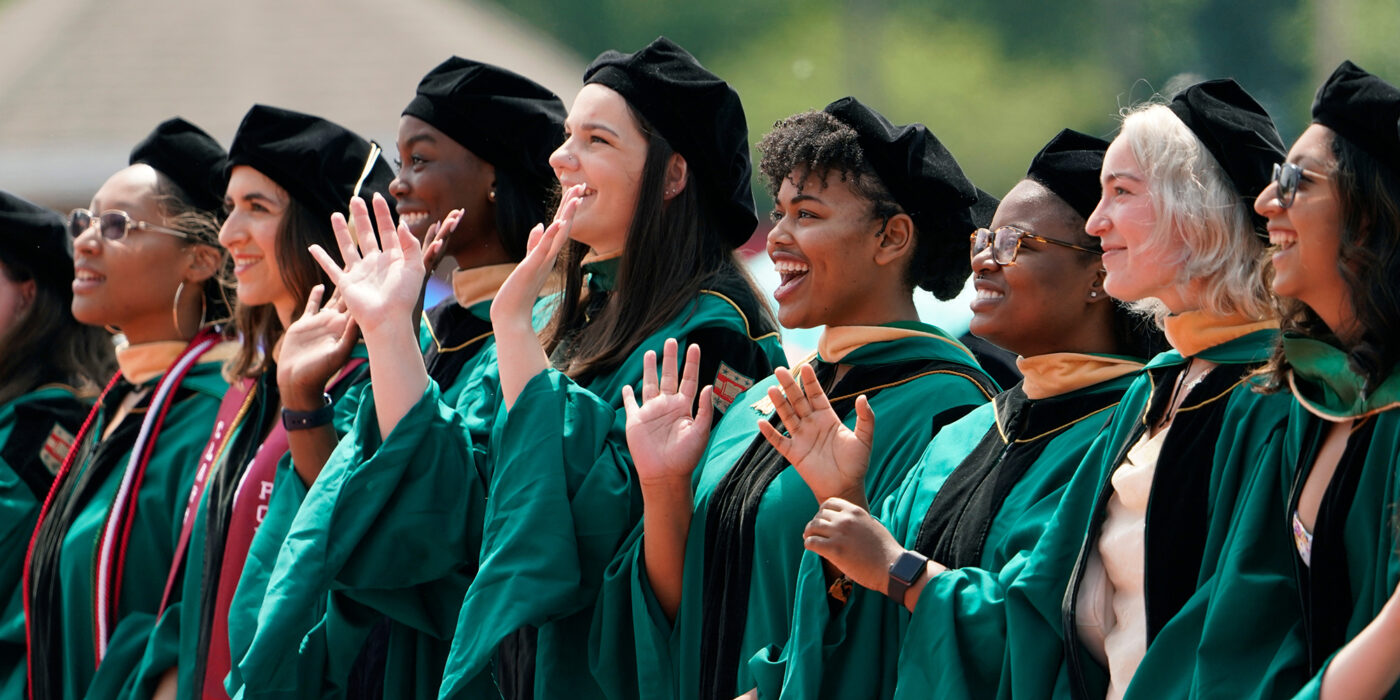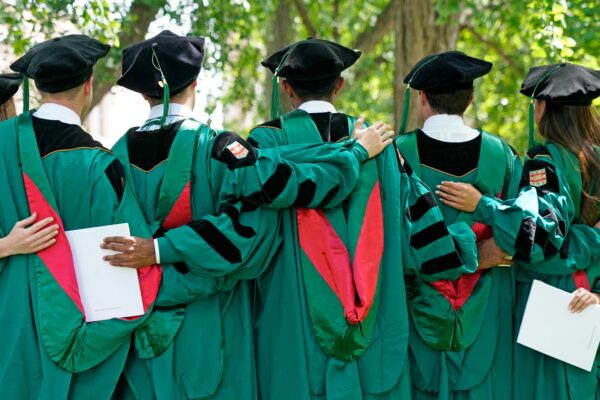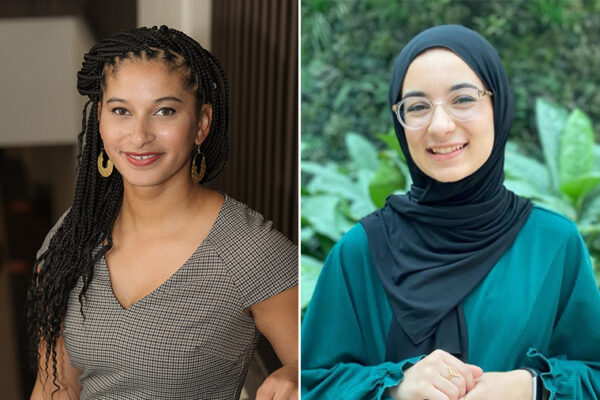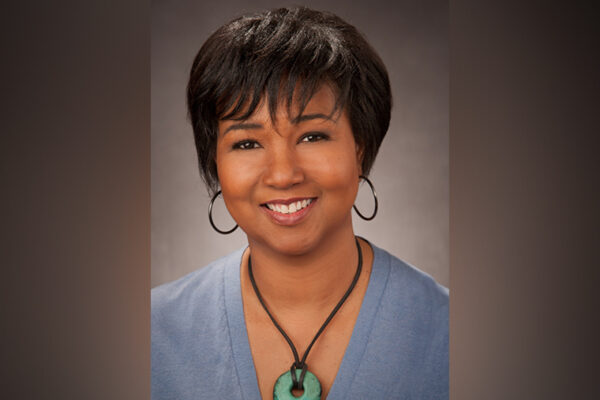After being lauded for learning to solve problems on shaky ground and being urged to look up at the sky by a woman who has been beyond it, Washington University in St. Louis’ Class of 2022 was sent forth to great fanfare at the 161st Commencement.
And if ever a class deserved an epic party, it was this one. Before leaving the Danforth Campus for good, graduates, their families and friends, faculty and alumni classes of 1970, 1971 and 1972 were treated to a historic first: a post-Commencement festival that stretched nearly the entire length of the Danforth Campus, from Mudd Field on the western edge to Tisch Park on the east end. And after two-plus years of studying under the specter of the global COVID-19 pandemic, the mood was light, festive and one of sweet relief.
But before the celebration, there was ceremony on Francis Olympic Field — Commencement’s now-permanent home. It is traditionally among the best days of the year at WashU, with music, speeches and the traditional tossing of academic headwear, and there was all of that and more. At the Commencement ceremony, degrees were officially bestowed on approximately 3,800 members of the Class of 2022 by Chancellor Andrew D. Martin — the largest number of graduates ever, he said.
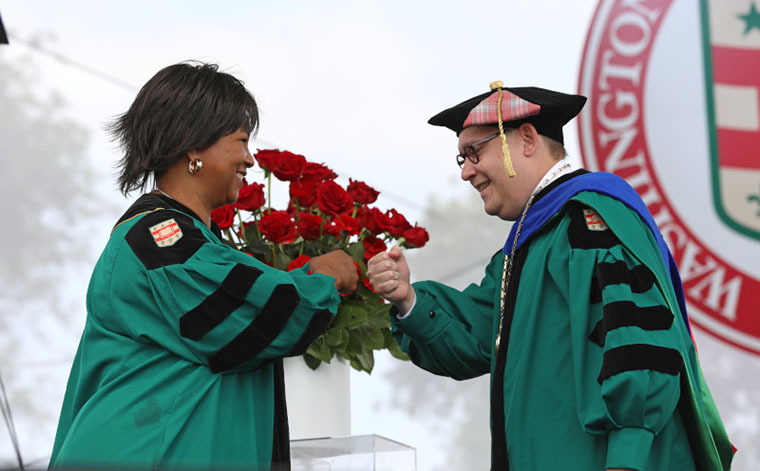
“Life is unpredictable,” Martin told the graduates, who knew full well what that meant. “You are being asked to take your next step toward a life of meaning on ground that won’t stop shaking. You may be tired of developing resilience; however, I firmly believe you have persevered through storms that have made you more ready than you know for the opportunities before you.”
Martin encouraged the class to look inside itself as it went out into the world. “The best question is not what do you want to be, but who do you want to be?” he said.
“It’s the difference between putting your energy into cultivating an identity, and instead putting it into building a life of integrity. And it’s a question for a lifetime.”
‘I’m so glad we could be here’
Clad in familiar green academic regalia, the graduates began parading into Francis Olympic Field promptly at 9 a.m. to live music provided by the Washington University Brass Band.
Family and friends patiently waited for the nearly hourlong procession into the stadium. The family of Priscilla Stecher had traveled from Pennsylvania and Colorado to meet on campus, including her father, Karl Stecher Jr., MD, a retired neurosurgeon who had done his residency at Barnes Hospital in the early 1960s.
“We’ve got a long day ahead of us,” he said, noting that his daughter was picking up both a medical degree from the School of Medicine and an MBA from Olin Business School later in the day — a marathon day, but nobody seemed to mind. “She’s worked so hard,” he said. “I’m so glad we could be here.”
Classes marched in, welcomed by grand marshal John Baugh, the Margaret Bush Wilson Professor in Arts & Sciences. After Arts & Sciences graduate Kevin Wang sang “America the Beautiful,” Andrew E. Newman, chair of the Board of Trustees, welcomed the approximately 15,000 family, friends and staff seated on the football field and up into the Francis Olympic Field bleachers.
Before introducing Commencement speaker Mae Jemison, MD, Newman made a special mention of Justin Hardy, the honorary student grand marshal, who earned his degree in December. Hardy’s story is known nationwide as he continued to play basketball for the WashU men’s team after graduating while being in a fierce battle with Stage 4 stomach cancer. His story has inspired sports fans across the country.
Jemison, the NASA astronaut who was the first woman of color to travel into space, delivered an inspiring Commencement address before receiving an honorary doctor of science degree. She recognized the uncertainty of the times but spoke of a simple, concrete way for the Class to 2022 to help effect change.
“Look up,” she told them. Look up from phones, computers, devices, look up at the sky every day, she said, noting that even the simple act of lifting eyes upward could be mood-changing and life-changing.
“Whenever you start to feel down, look up from your device, go outside, look up at the sky, and acknowledge that you are part of this universe and you have as much right to be here as any speck of stardust,” she said. “Look up.”
She told them her perspective changed when she was presented with a unique vantage point during her time as a mission specialist for NASA’s space shuttle Endeavour in September 1992. She spent eight days in space, orbiting the Earth 127 times.
“I had the opportunity to look out at the Earth,” she said. “And I saw this thin shimmering layer of blue light as our atmosphere and it confirmed something that I always believed in — in the Earth, with its incredible beauty and these vistas, sights, sounds and smells that are so comforting.
“The Earth will be here, we might not. We’re not mandatory for the Earth to survive, but the Earth is mandatory for us.”
She recognized that the students were graduating at a time of great upheaval, but that they were well suited to take on the challenges of the coming years, and that she honored their commitment, admitting that at times, she, too, wished she could be a part of their generation.
“Make sure that you don’t substitute algorithms for your own critical capacity to think,” she said. “It’s seductive, but it’s dangerous. You have to think through things to understand. Do not give that up.
“You have the right to reconcile that you’re part of nature, not outside of it.”
A time for memories
The Class of 2022 survived what graduate student speaker Bryanna Brown called a “meteor colliding” with their student experience. And it wasn’t just the pandemic — it was social issues, too, like numerous senseless killings of Black Americans, anti-Asian hate crimes and the war in Ukraine.
But that experience gave the class a resiliency like no other. “I am thrilled to stand in front of you all today knowing you will fight alongside me to work toward a more just world,” Brown said. “I have witnessed your commitment to action here and know this to be true.”
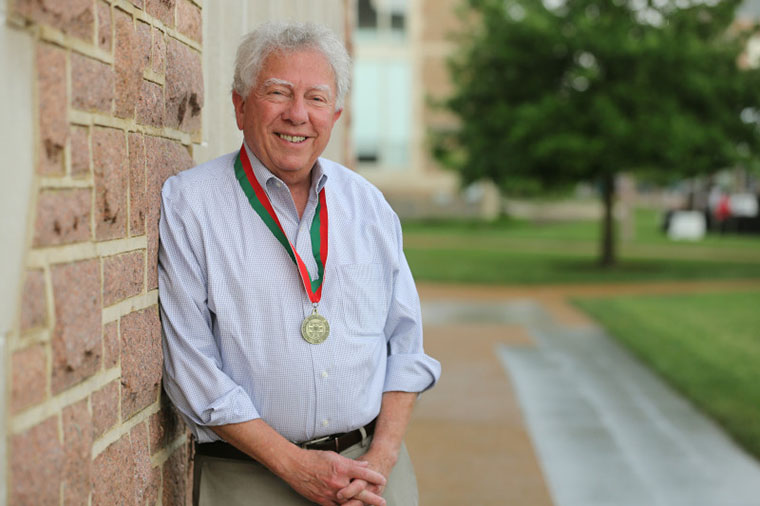
The Class of 2022 is embarking into an uncertain world, much as students in the early 1970s did. The similarity was not lost on the nearly 200 members of the 50th reunion classes of 1970, 1971 and 1972 — asked to return as a triumvirate because Commencement 2020 was canceled and 2021 was truncated.
The eras are different and they’re similar, said Hank Klibanoff, of the Class of 1971, a longtime journalist, Pulitzer Prize-winning author, Peabody Award-winning podcaster and now a professor at Emory University. “Our years here were filled with tension and fear,” he said. “Fear of going to Vietnam; fear of what would happen if we refused; fear not just of the government or of the police, but fear of letting our parents down, of having to go in a direction we hadn’t anticipated coming out of high school.”
Reflecting back on the trajectory of the civil rights movement all the ensuing years after he and his classmates graduated — including the tumult of the present moment, “It does seem like the price that was paid back then was maybe not enough,” he said.
“And then you begin to wonder: Why is it so hard to bring others along on simple, basic human rights?” But even pondering that from his seat at Francis Field, where hundreds of alumni returned to celebrate, Klibanoff was happy to be back and relished the friends he had made and the faculty that helped shape him.
“I was privileged to have such great instructors as Barry Commoner, Stanley Elkin, Howard Nemerov and Peter Riesenberg — they and many others had an enormous influence on me,” he said. “I came away from my Washington University experience with a great appreciation for deep research, deep scholarship and deep thinking.”
“The relationships you’ve built at WashU won’t end the minute you receive your diploma,” undergraduate student speaker Noor Ghanam said in her address. “Once a member of this vast WashU community, always a member of the WashU community.”
A sentiment echoed by Klibanoff as he walked through the campus before picking up his cap and gown. “I can’t imagine a more beautiful campus in America,” he said. “I love the feel, the sense of it. WashU is filled with memories that just don’t go away. They last forever.”
Read Chancellor Martin’s message to the Class of 2022.
Read undergraduate student speaker Noor Ghanam’s address.
Read graduate student speaker Bryanna Brown’s address.
